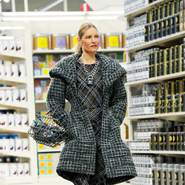- About
- Subscribe Now
- New York,
December 15, 2014

 Chanel fall/ winter 2014 runway look
Chanel fall/ winter 2014 runway look
Affluent consumers have recovered from the recession, but their willingness to spend is reserved, according to a new report from Unity Marketing.
Bragging rights have changed from the designer to the bargain, and affluent consumers are not necessarily looking for the best brand or design, but what they can receive for their money. This change in attitude often spearheads from the younger generations that are growing up into the target consumers for many brands, therefore a notion that holds high importance for many luxury marketers.
“Millennials are going to change everything,” said Pam Danziger, president of Unity Marketing, Stevens, PA. “It is a generation, I think, that is saying 'We don’t need to load ourselves up with extra baggage. If I have access, I don’t need ownership.'”
Five Luxe Trends for 2015 is a report prepared by Pam Danziger of Unity Marketing.
Attitude adjustment
The new attitude towards wealth and spending seen from affluents will affect the way that luxury brands market. Their consumers are no longer looking for just the top designers or products, but also for ways for them to be “smart shoppers.”
Millennials are slowly emerging in the luxury market and are pushing the boundaries of the expectations and experiences expected from luxury brands.
In the report, Chanel’s runway show from this past spring is discussed as an example of the new style of luxury.
Chanel designed an unusual set for its fall/winter 2014-15 runway show, making the venue look like a supermarket.
Models walked down the aisles or in between the checkout lanes, pushing shopping carts or toting wire baskets. By using such a plebeian setting for a fashion show, the brand took away some of the fantasy, while adding a layer of fun to its presentation (see story).
The notion of luxury in a shopping market demonstrates the way in which luxury and the consumer is evolving.
Luxury brands need to design a new story that informs the consumer about the brand and the details behind the products and story.
Ratings of luxury brands
When the American Affluence Research Center polled 327 individuals with net worth of $800,000 (the top 10 percent most wealthy) they found that brands like Louis Vuitton, Gucci, Hermes and Prada were thought to be overrated.
Brands that have been employing the same marketing strategies for years are often overlooked by consumers. It is those with new, innovative ways that are looked to by affluents.
The report narrows in on Saint Laurent’s look toward the future.
The rebranding of Yves Saint Laurent to Saint Laurent Paris affected, in the short term, the brand’s relationship with its customers as they adapt to the new name for the French design house (see story).
Luxury brands need new plans
The ultra affluents seem to be buying more like the younger, high-earners-not-rich-yet population. Their concept of luxury is evolving.
Luxury brands are faced with the challenge of evolving with the concept and the consumer.
Change is good
Looking into the trends, habits and beliefs of the top-tier market can help brands reimagine themselves for future generations.
For instance, most affluents tend to shop in-store, but one-fourth of these consumers consider online a better option, according to a eport from Unity Marketing.
The “Trends in How Affluents Shop” report looks at the details behind the motivation, manners and thoughts of affluent consumers and their consumption habits. Brands and retailers with this knowledge will be able to look at their top consumers in a different light and adjust their marketing strategies to benefit the brand in the fourth quarter of 2014 (see story).
Adjusting to the new consumer is important for brands to survive economically.
“I hear a lot about the economy bouncing back and I am just not buying it,”Ms. Danziger. “I looked at the retail sales history and it was the lowest we have seen since the recession.
“I am very concerned about it,” she said. “The affluents are concerned and they are defining luxury in new and different ways which means luxury brands have to tell new stories.”
Final Take
Nancy Buckley, editorial assistant on Luxury Daily, New York
Share your thoughts. Click here